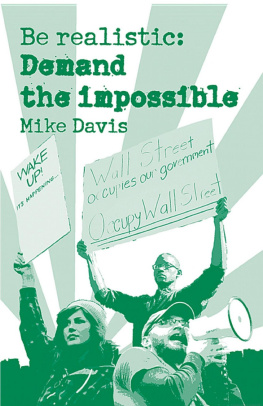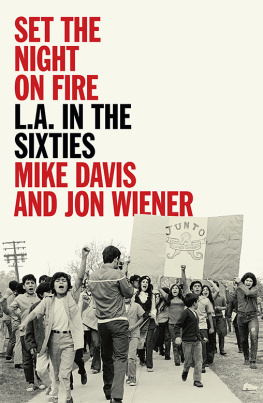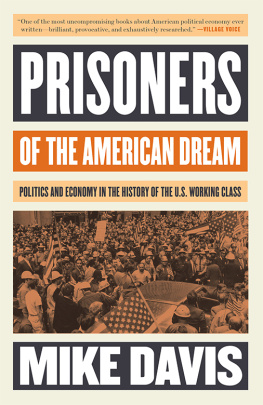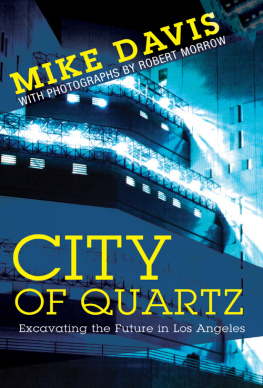Be Realistic: Demand the Impossible
2011 by Mike Davis
Published 2012 by Haymarket Books
PO Box 180165
Chicago, IL 60618
773-583-7884
www.haymarketbooks.org
info@haymarketbooks.org
Trade Distribution:
In the US, Consortium Book Sales and Distribution, www.cbsd.com
In Canada, Publishers Group Canada, www.pgcbooks.ca
In the UK, Turnaround Publisher Services, www.turnaround-uk.com
In Autralia, Palgrave Macmillan, www.palgravemacmillan.com.au
All other countries, Publishers Group Worldwide, www.pgw.com
ISBN: 978-1-60846-230-8
Library of Congress Cataloging-in-Publication data is available
Contents

No More Bubblegum
W HO COULD have envisioned Occupy Wall Street and its sudden wildflower-like profusion in cities large and small?
John Carpenter did. Almost a quarter of a century ago (1988), the master of date-night terror ( Halloween , The Thing , etc.) wrote and directed They Live depicting the Age of Reagan as a catastrophic alien invasion. It remains his subversive tour de force.
Indeed, who can ever forget the brilliant early scenes of the huge third-world shantytown reflected across the Hollywood Freeway by the sinister mirror-glass of Bunker Hills corporate skyscrapers? Or Carpenters portrayal of billionaire bankers and evil mediacrats ruling over a pulverized American working class living in tents on a rubble-strewn hillside and begging for casual jobs?
From this negative equality of homelessness and despair, and thanks to the magic dark glasses found by the enigmatic Nada (played by Roddy Piper), the proletariat finally achieves interracial unity, sees through the subliminal deceptions of capitalism, and gets angry. Very angry.
Yes, I know, Im reading ahead. The Occupy the World movement is still looking for its magic glasses (program, demands, strategy, and so on) and its anger remains on Gandhian low heat.
But, as Carpenter foresaw, force enough Americans out of their homes and/or careers (or at least torment tens of millions with the possibility) and something new and huge will begin to slouch toward Goldman Sachs. And unlike the Tea Party, so far it has no puppet strings.
One of the most important facts about the current uprising is simply that it has occupied the street and created an existential identification with the homeless.
Quite frankly, my generation, trained in the civil rights movement, would have thought first of sitting in the buildings and waiting for the police to drag and club us out the door. (Today, pepper spray and pain compliance techniques are preferred by the cops.)
In 1965, when I was just eighteen and on the national staff of Students for a Democratic Society, I planned a sit-in at the Chase Manhattan Bank, a partner in apartheid for its key role in financing South Africa after the massacre of peaceful demonstrators. It was the first protest on Wall Street in a generation. Forty-one people were hauled away by the NYPD.
I still think that taking over the skyscrapers is a splendid idea, but for a later stage in the struggle. The genius of Occupy Wall Street, for now, is that it has temporarily liberated some of the most expensive real estate in the world and turned a privatized square into a magnetic public space and catalyst for protest.
Our sit-in forty-six years ago was a guerrilla raid; this is Wall Street under siege by the Lilliputians. Its also the triumph of the supposedly archaic principle of face-to-face, dialogic organizing. Social media is important, sure, but not omnipotent. Activist self-organizationthe crystallization of political will from free discussionstill thrives best in an actual urban forum.
Put another way, most of our Internet conversations are preaching to the choir; even the mega-sites like MoveOn.com are tuned to the channel of the already converted, or at least their probable demographic.
The occupations likewise are lightning rods, first and above all, for the scorned, alienated ranks of progressive Democrats, but, in addition, they appear to be breaking down generational barriers, providing the missing common ground, for instance, for imperiled middle-age schoolteachers to compare notes with pauperized young college graduates.
More radically, the encampments have become symbolic sites for healing the divisions within the New Deal coalition inflicted during the Nixon years. As Jon Wiener observes in his always smart blog at The Nation , hard hats and hippiestogether at last.
Indeed. Who could not be moved when AFL-CIO president Richard Trumkawho brought his coal miners to Wall Street in 1989 during their bitter but ultimately successful strike against Pittston Coal Companycalled upon his broad-shouldered women and men to stand guard over Zuccotti Park in the face of an expected attack by the NYPD?
A LTHOUGH OLD radicals like me are too apt to declare each new baby the messiah, this child has the rainbow sign. I believe that were seeing the rebirth of the quality that so markedly defined the ordinary people of my parents generation (migrants and strikers of the Great Depression): a broad, spontaneous compassion and solidarity based on a dangerously egalitarian ethic.
Stop and give a hitchhiking family a ride. Never cross a picket line, even when your family cant pay the rent. Share your last cigarette with a stranger. Steal milk when your kids have none and then give half to the little kids next door (this is what my own mother did repeatedly in 1936). Listen carefully to the quiet, profound people who have lost everything but their dignity. Cultivate the generosity of the we.
What I mean to say, I suppose, is that Im most impressed by those folks whove rallied to defend the occupations despite often significant differences in age, social class, and race. But equally, I adore the gusty kids who are ready to face the coming winter on freezing streets, just like their homeless sisters and brothers.
Butback to strategywhats the next link in the chain (in Lenins sense) that needs to be grasped? How imperative is it for the wildflowers to hold a convention, adopt programmatic demands, and thereby put themselves up for bid on the auction block of the 2012 elections? Obama and the Democrats will certainly, and perhaps desperately, need their energy and authenticity.
But the occupationistas are unlikely to put themselves or their extraordinary self-organizing process up for sale. Personally, I lean toward the anarchist position and its obvious imperatives.
First , expose the pain of the 99 percent. Put Wall Street on trial. Bring Harrisburg, Loredo, Riverside, Camden, Flint, Gallup, and Holly Springs to downtown New York. Confront the predators with their victims. A national tribunal on economic mass murder.
Second, continue to democratize and productively occupy public space (i.e., reclaim the commons). The veteran Bronx activist-historian Mark Naison has proposed a bold plan for converting the derelict and abandoned spaces of New York into survival resources (gardens, campsites, playgrounds) for the unsheltered and unemployed. The Occupy protestors across the country now know what its like to be homeless and banned from sleeping in parks or under a tent. All the more reason to break the locks and scale the fences that separate unused space from urgent human needs.
Third, keep our eyes on the real prize. The great issue is not raising taxes on the rich or achieving a better regulation of banks. Its economic democracythe right of ordinary people to make macro-decisions about social investment, interest rates, capital flows, job creation, global warming, and the like. If the debate isnt about economic power, its irrelevant.
Next page












